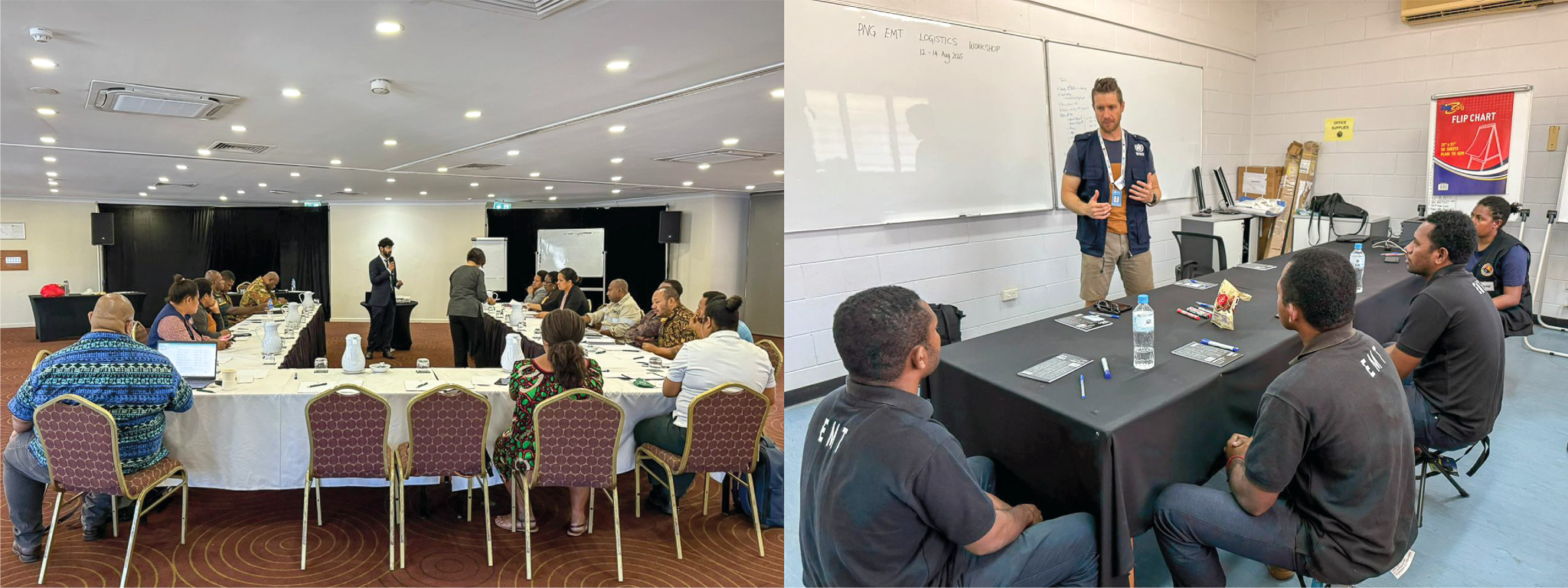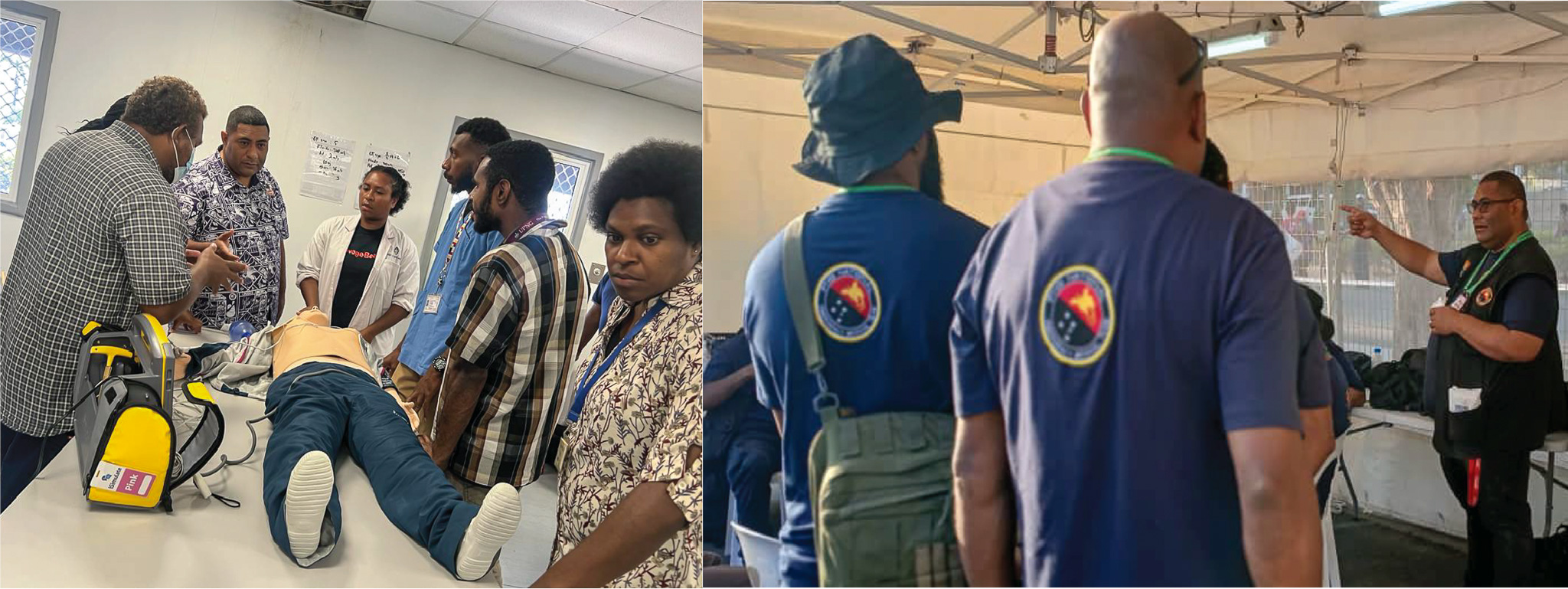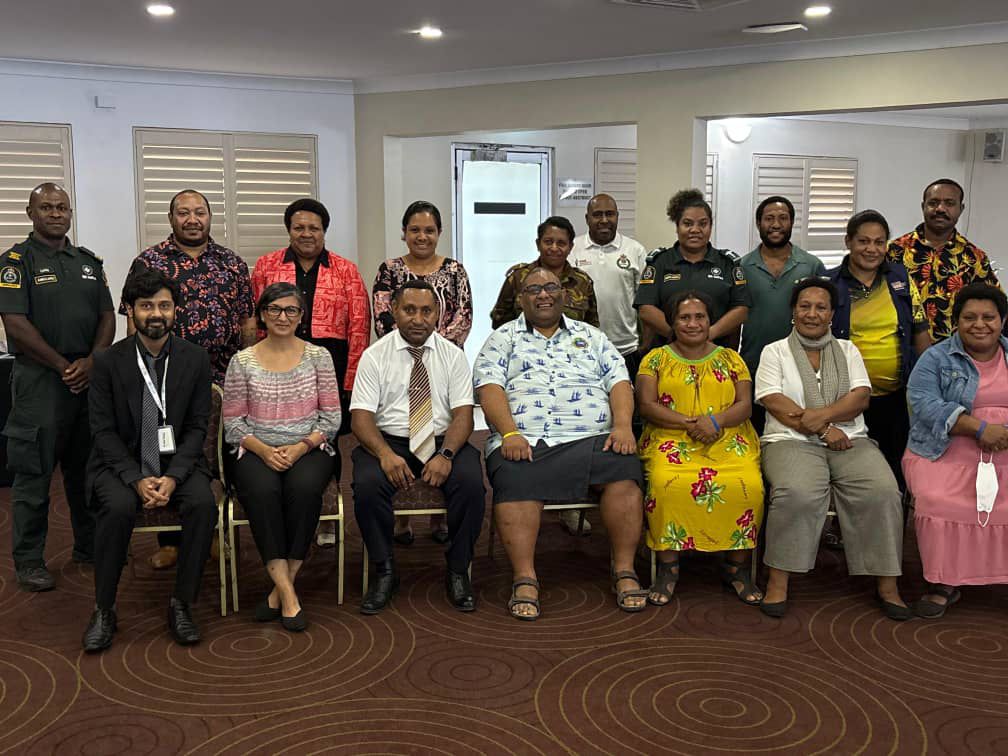Underscoring the crucial need for mental health services as part of the overall health response amid emergencies, WHO and the Papua New Guinea National Department of Health piloted a pioneering training programme on mental health and psychosocial support for the PNG Emergency Medical Team – the first training of its kind for the country and for an EMT in the Western Pacific Region.
The five-day training, developed and delivered by WHO from 11-15 August 2025, involved 17 participants from diverse backgrounds, all of whom are part of the PNG EMT: medical professionals, community-based service providers and representatives from partner agencies. Medical teams from Port Moresby General Hospital, PNG Defense Forces, St John Ambulance and the National Capital District Provincial Health Authority participated in the training.

Emergencies and disasters have profound impacts on individuals, families and communities. While some individuals will respond with resilience, a large number will respond with normal distress that usually alleviates over time, while others will experience an exacerbation of a pre-existing mental health condition or experience the onset of mental health conditions including anxiety, depression or post-traumatic stress disorder.
Integrating mental health and psychosocial support (MHPSS) is therefore a vital component of any emergency medical response. This includes complementary interventions such as meeting basic needs, reinforcing family and community support systems, and providing specialized mental health services.
Recognizing the psychosocial impact that often accompanies public health emergencies, including those related to disasters due to natural hazards and disease outbreaks, PNG’s National Department of Health has prioritized strengthening national capacities in this area. In this intensive programme, national first responders were introduced to the mental health impacts of disasters, outbreaks and conflict; learnt how to identify priority mental health and substance use issues in emergency-affected individuals; developed a framework for integrating MHPSS when triaging patients; and practiced delivering basic psychosocial support.
Dr Garry Nou, Deputy Chief of Emergency Medicine at the National Department of Health, PNG and Team Lead of PNG EMT, shared his appreciation for this first-ever EMT MPHSS training. “Recent outbreaks of mob violence and social unrest in Port Moresby highlight the need for health workers to understand how psychosocial harm extends beyond individuals to impact entire families and communities. These underlying factors in PNG will compound the impact of disasters, or emergencies, well beyond what is on the surface. This training strengthens our ability to address not only clinical needs but also the broader social challenges that deeply affect mental wellbeing.”

Echoing the value of this capacity building exercise, the Deputy Head of WHO’s Country Office in Papua New Guinea, Dr Josaia Tiko said: “This is landmark achievement in strengthening the country’s emergency preparedness. Emergencies and disasters challenge not only our health systems but also profoundly affect the minds and hearts of our people. By equipping PNG’s EMTs and frontline responders with the skills to deliver compassionate, culturally grounded psychosocial care, we are investing in the resilience, dignity and recovery of both communities and responders.
The World Health Organization is honoured to stand alongside the National Department of Health, the PNG Defence Forces, the Australian Department of Foreign Affairs and Trade, and other partners to ensure that mental health is firmly embedded as a cornerstone of our health emergency response.”
The MHPSS training curriculum for EMTs is based on global MHPSS guidance and capacity building tools including the Inter-Agency Standing Committee (IASC) Guidelines on Mental Health and Psychosocial Support in Emergency Settings and WHO’s Mental Health Gap Action Program – Humanitarian Intervention Guide (mhGAP-HIG).

Pacific island countries, like Papua New Guinea, are increasingly impacted by climate-change related risks: landslides, tropical cyclones, flooding, storm surges, rising sea levels, and fluctuating weather patterns. The hazard-prone country is regularly exposed to earthquakes, tsunami, volcanic eruptions, and landslides. From 2010−2021, over 200,000 displacements associated with 47 disaster events were recorded across Papua New Guinea.
Inspired by the success in Papua New Guinea, WHO will apply this training curriculum in other countries in the Western Pacific Region, and work towards integrating MPHSS modules into training curricula for all EMTs. WHO is also developing standards for MHPSS Specialized Care Teams (SCTs), which will deploy to emergencies specifically to provide surge MHPSS capacity.
This vital work was made possible through support from the Australian Department of Foreign Affairs and Trade.
Related links
Emergency Medical Teams (EMTs) are groups of health professionals who provide care to patients affected by disasters, outbreaks and other emergencies. Papua New Guinea’s EMT (PNG EMT) was established to respond to national emergencies, as well as support neighbouring countries during a crisis. PNG EMT is currently working towards WHO classification as a quality-assured international EMT.
